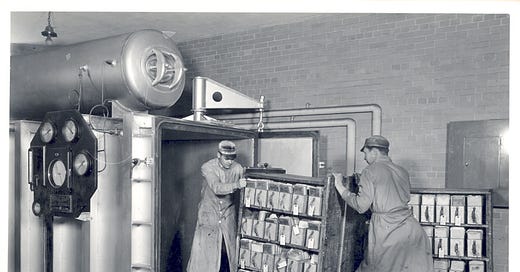I’m late to the party … I’ve just started reading Thich Nhat Hanh.
On Sunday evenings, I absorb a few pages of The Art of Living and then settle in for Kundalini led by Hari. I huddle in the tight space between my kitchen and living room; an island on one side and a lovingly used chair on the other. I’m warm and protected. I hold long, suspended breaths - ones that I’m convinced will break me - and I meditate on Thay’s words.
But it’s not always seamless - in my mind at least. Last week, as I read Thay’s words, that usually warm and sweet veil of protection turned heavy.
Impermanence. “Impermanence is something wonderful. If things were not impermanent, life would not be possible.” Yes, so little, or even nothing, is permanent. I know this. I understand this. I even like this.
But then a chill ran down my spine.
Ancient Egyptians believed that we die twice: when we take our last breath and when our name is spoken for the last time.
I’ve heard this saying dozens of times and different versions are attributed from Hemingway to Pacino.
But as provocative as that quote is, I have to disagree.
I think our second death, though related, is when the last record of our existence disappears. When the ink on our letters fades away. When our photos turn brownish-yellow and the figures become unrecognizable. When the hard drive that contains all of life’s work crashes. Worse, when all that this left of us turns to ash.

There’s been a steady flow of reports about Russia deliberately destroying Ukrainian archives and libraries. And as I read through the details of these horrors, my archivist heart slows and achingly contracts. I suspend my breath but not in the meditative way that Hari has taught me. I’m afraid.
The destruction of libraries and archives in times of war is tragically common. But when they are attacked, more than the destruction of books is involved. These institutions are cultural repositories. They hold collective memory, preserve cultural heritage, showcase societal development, and offer the opportunity for growth. The deliberate destruction of these places creates a fogginess at best and a total blackout at worst, where the past is no longer the definitive past.
The preservation of human life must be our top priority. And yet, that should not and cannot be in contradiction with stopping attacks on institutions of knowledge.
As citizens of the Earth, we must unite to safeguard knowledge and to ensure a future in which crucial chapters of human history and memory are not wiped out. Preservation is part and parcel of protecting a people and their spirit.
Facts and history and culture are not impermanent.
If you studied history in Louisiana, like I did, you know that Gwendolyn Midlo Hall is an icon.
For almost all of the 20th century, American historians assumed that there was little material to be found about enslaved Africans in the colonial era; their names were assumed lost to time or, and more likely, never recorded.
Midlo Hall showed that this was not the case. While conducting research, she discovered a record book in which French colonial notaries had documented, in precise detail, the identities of thousands of enslaved Africans who were forcefully migrated to Louisiana in the 18th century.
The notaries had written down not just their names but also their places of origin, their families, the ships they arrived on, their skills, and even personality traits.
Midlo Hall spent the next seven years searching for similar books, gathering what she found into a database, and eventually identifying a staggering 107,000 people - they had previously been referred to as simply “slaves.” She then used that material to revolutionize historians’ understanding of slavery. She showed that about two-thirds of the enslaved Africans brought to Louisiana came from the area that is now Senegal and Gambia. (Think about how our understanding of others and ourselves broadens just by knowing places of origin!)
Her work not only inspired historians to dive deeper into the early history of American slavery; but more importantly it enabled millions of people to discover roots they long thought had been severed.
That’s what records do, they give life to beings that are no more. They give faces and context and names to the amorphous ghosts of the past. It makes us see others concrete as human beings.
So, if you ever find yourself in South Louisiana, I insist that you go to the Whitney Plantation, the first museum of slavery in the United States. There you will see a monument - Allées Gwendolyn Midlo Hall - that records the names of 107,000 people held in bondage in Louisiana from 1719 to 1820. Only traces of their lives and sufferings remain, but this monument, which is as permanent an installation as we are capable of, allows us to be with them, always. You can read their names and stand on the very lands they did.
The passing of time halted by undisturbed archives and a dogged historian.
I’ve spent the last ten years of my professional life walking in the shadows of the past.
I preserve people’s photos and writings and videos and I forget that their physical bodies are no more.
I often speak of them in the present tense. “Look at this photo of James I found,” I say to my coworker. “He’s so handsome.”
He is.
He’s alive in the archive. I see him clearly through his photos - looking on lovingly at his wife and son. I hear his loud, firm voice seep out of a cassette.
I’m working with him and for him. And for you. For all of us.
We all leave threads behind. Threads that if pulled, stop time and bring us flashing back to what is no more and who was there.
I like that I am impermanent. But I want people to know that I am here and what I carry with me. At times, I move like a dark star. That I am often too careful. On other days, lighthearted.
That I long to remain.
And I want parts of you, as you are right now, to remain with me. I want us to shed breadcrumbs of ourselves as we journey - Our records.
And maybe two hundred years from now, some historian will lean back in an old, wooden chair in some dark, cold research room, ready to uncover the whole story of you or me and how we changed minute by minute.
Our impermanence making us permanent.
I’ll see you in two weeks. Happy holidays ❤️❤️❤️






I have never thought of preserving people’s existence through records, although I suppose it explains the urge to write. To not be lost. I love the idea of giving dignity to the people of the past even simply by remembering their existence. I have a lot of grief around knowing nothing of my own ancestors. So much to think about in this piece--I’m so glad you wrote it.
Such a great point, just looking at old photos that survived is already special. I wish more survived from my family, but a lot was destroyed by bollsheviks